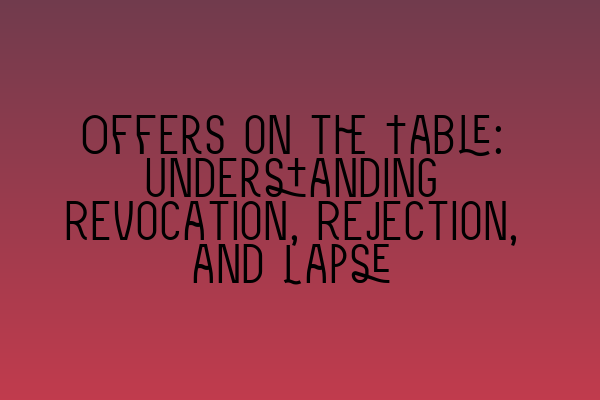Offers on the Table: Understanding Revocation, Rejection, and Lapse
When it comes to contract law, one of the most crucial elements is the offer. An offer is a proposal made by one party to another, indicating a willingness to enter into a legally binding agreement. However, the process of making and accepting offers can be complex, and it’s essential to understand the concepts of revocation, rejection, and lapse.
In this article, we will delve into these three key concepts and examine their implications in contract law. By understanding the intricacies of revocation, rejection, and lapse, you will gain valuable insights into the dynamics of contractual agreements.
Revocation: Withdrawing an Offer
Revocation refers to the act of withdrawing an offer before it is accepted. It is important to note that an offer can be revoked by the offeror at any time until it has been accepted. The revocation of an offer terminates the offer and prevents the formation of a binding contract.
However, it’s crucial to consider the timing and manner of revocation. In most cases, revocation becomes effective only when it is communicated to the offeree. This means that if the offeree is unaware of the revocation and accepts the offer, a contract may still be formed despite the attempted revocation. Therefore, it is advisable for the offeror to communicate the revocation clearly and promptly to avoid any confusion or disputes.
For a better understanding of the impact of frustration on contractual obligations, you may find our relevant article on Exploring the Impact of Frustration on Contractual Obligations: Legal Insights highly informative.
Rejection: Declining an Offer
Rejection occurs when the offeree declines the offer made by the offeror. A rejection can be express, where the offeree explicitly states their refusal to accept the offer, or implied, where the offeree’s conduct indicates their unwillingness to be bound by the offer.
It’s important to note that a rejection terminates the offer and brings the negotiation to an end. Once an offer has been rejected, the offeror is no longer bound by the terms of the original offer.
In some cases, the offeree may attempt to negotiate the terms of the offer instead of outright rejection. This is known as a counteroffer. A counteroffer constitutes both a rejection of the original offer and a new offer made by the offeree. The original offeror can then accept, reject, or make a counteroffer in response, thus continuing the negotiation process.
To gain insights into unlocking the hidden meanings within contractual clauses, we recommend you read our article on Interpreting Contractual Clauses: Unlocking the Hidden Meanings.
Lapse: Expiry of an Offer
Lapse refers to the expiration of an offer. An offer can lapse for various reasons, including the passage of time, failure of a condition precedent, or the death or insanity of either party.
The general rule is that an offer remains open for acceptance until it is revoked, rejected, or lapses. However, it is essential to clarify the duration of the offer to avoid any misunderstandings. If no time period is specified in the offer, it is considered open for a reasonable amount of time. What is deemed reasonable may vary depending on the circumstances of the case.
It’s worth noting that an offer can also be terminated if either party becomes incapable of performing the contract due to an unforeseen event. This is known as frustration of contract. For a deeper understanding of this concept, you can refer to our article on Exploring the Impact of Frustration on Contractual Obligations: Legal Insights.
In Summary
Offers, revocation, rejection, and lapse are fundamental aspects of contract law. Understanding how these concepts interact is essential for navigating contractual agreements.
In conclusion, as an offeror or offeree, it is crucial to be aware of your rights and responsibilities when it comes to offers and their acceptance. Keep in mind that the timing and communication of revocation, rejection, and lapse can significantly impact the formation of a contract.
For entrepreneurs and professionals dealing with business contracts, our article on Legal Aspects of Business Contracts: Key Considerations for Entrepreneurs provides valuable insights into the key considerations to keep in mind.
Lastly, if you are interested in comparing traditional legal qualifications to the new SQE Contract Law qualification, our article on SQE Contract Law vs. Traditional Qualifications: A Comparative Analysis can help you make an informed decision.
We hope this article has provided you with a comprehensive understanding of revocation, rejection, and lapse in contract law. Feel free to explore our other articles for deeper insights into various aspects of contract law, such as different types of agreements, by visiting Agreements in Contract Law: Understanding Its Various Types.
